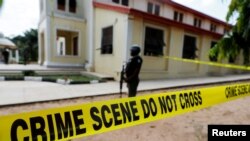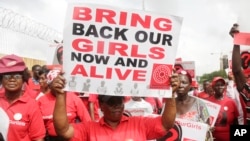Nigerian President Bola Tinubu has ordered security forces to rescue an unspecified number of female students being held by armed kidnappers following an attack Friday at the Federal University Gusau in northwest Zamfara state.
Police officials say some victims have been rescued, but the incident is the latest in an escalating wave of violence targeting schools in northern Nigeria.
Tinubu's directive to security agencies to secure the remaining female students was contained in a statement Sunday by the presidency.
Tinubu condemned the kidnappings, saying there is no moral justification for such heinous acts against these innocent victims.
He also promised the families that all the girls would be rescued, and the perpetrators would pay.
Zamfara state police spokesperson, Yazid Abubakar, told VOA by phone Monday that security agencies are heeding the president's order.
"Now on the ground we've been able to rescue seven of them and effort is ongoing to rescue the others. Our security has been deployed everywhere, normalcy has been restored, students are even in their lecture rooms," Abubakar said. "All hands are on deck to make sure that such incidents do not occur again."
Eyewitnesses say scores of gunmen on motorbikes attacked a rented facility housing three female hostels early Friday and took away dozens of students.
Police and school authorities say they have yet to determine the actual number of girls taken but say seven rescued victims have been reunited with their families.
The attack is the latest in a three-year wave of insecurity sweeping across northwest and central Nigeria.
The incident triggered an online campaign dubbed Bring Back our FUGUS Girls. The campaign slogan is similar to a 2014 movement, Bring Back Our Girls or BBOG, which spread across the world after more than 270 schoolgirls were abducted by Boko Haram militants in the town of Chibok in northeastern Borno state.
Activist Abba Abiyos Roni is one of the campaigners on X, formerly known as Twitter. He accused authorities of not being proactive.
"The first person to blame is the government. As I see in reports, there were about 50 motorists. Fifty motorists is something huge that the government (security) can easily identify or tackle before they even took the students, we don't know why they did not respond," he said.
Kidnapping for ransom is a major problem in Nigeria. Fixing it was one of Tinubu’s campaign promises. He also faces serious economic challenges that he has been trying to address through policy reforms.
Nigeria is also mired in a protracted war with Islamic militants — lasting more than 14 years in the northeastern region — while violence from separatists has rattled the southeast.
Amnesty International says security gaps are to blame for the persistent attacks and called on authorities to investigate.
In June, protesting the abduction of five students from Federal University Gusau, angry students blocked roadways calling for action.





